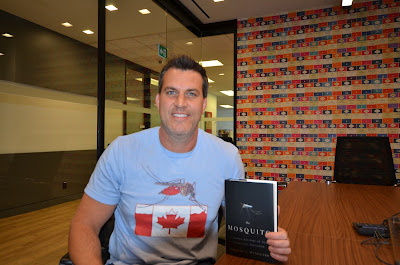Mosquito The Book Canadians Are Itching to Read
Killer Book About Killer Bug In The Running For The RBC Taylor Prize
 |
| Timothy Winegard by Herman Silochan |
This is the last year for the RBC
Charles Taylor Prize. The non-fiction Canadian book prize is closing down in
March after marking 20-years of rewarding the country’s best authors.
The Prize recently announced the last
five authors on the shortlist to win the Prize. One of their books, Timothy
Winegard’s history of the Mosquito will have Caribbean readers itching to buy
insect spray and install bug proof screens.
The female mosquito has, through
history, killed more people with her bite than all the wars in the history of
man. In the Caribbean, where the fears of dengue, malaria, West Nile and sickle
cell, grow, the mosquito is to blame.
Dr. Winegard is a Sarnia born,
hockey-loving historian who now teaches at the Colorado Mesa University. He has
served in both the Canadian and British Armed Forces and knows about war. He
says the world is losing the battle against the mosquito, our deadliest
predator.
Mosquito is a fascinating, fact-based
and timely overview of how mosquitos have impacted our life histories. It has
always been the carrier of fatal diseases, the killer of communities, a factor
in wars, a crippler of economies and “killing nearly half of humanity along the
way”.
As we are finding, the former pesticides
we used to spray are now almost useless. These tiny vampires adapt and evolve.
The author asks, what are our chances? He answers his own question with: Not
Good.
In the Caribbean it was in the 17th
century that the slave trade introduced disease carrying mosquitos to the
Islands. Fatality rates of arriving ships was devastating with 85% of crew and
living cargo dropping dead from outbreaks of Yellow Fever.
“The salty sea stories of ghost ships
like the Flying Dutchmen, ”he writes, “Are based on true accounts. Whole crews
would succumb to yellow fever, months passing before the aimlessly drifting
ships were recovered. Boarding parties were greeted with nothing but the
stench of death and the rattle of skeletons with no revealing clues to the
cause.”
In Africa sickle-cell anemia, according
to the author, evolved as the body’s defence against contracting malaria. It
was protection with a price. Malaria was kept at bay but the life span of
people with SCA is dramatically shortened.
Slaves who were taken to the Caribbean
brought malaria and other mosquito-borne diseases with them, infecting the
mosquito populations that were infection free. The islands population suffered
a terrible price in deaths and sickness.
 |
| Weir & Winegard |
Three hundred years later, the tools to
fight mosquitoes are losing their effect – new bug born diseases are appearing.
Although it doesn’t seem like it, the Caribbean is under attack.
The Charles Taylor Prize winner will be
revealed at a special 20th Anniversary gala luncheon on Monday March 2, 2020.
Dr. Winegard will be in Toronto for that event. He, and the four other short
listed authors will be speaking at a free Harbourfront evening lecture on
Thursday, February 27th He will be talking about mosquitoes. Are you itching to
go?
In other Charles Taylor Prize news
The
non-fiction prize created a professional development program to support the
next generation of Canadian writers. Each year five emerging writers, selected
from the nation’s writing programs, will be paired with the finalists for the
2020 RBC Taylor Prize for mentoring and writing assistance.
One of the five young authors selected
yesterday, Simone Dalton, is a writer with strong Caribbean ties. Dalton is a
writer born in Trinidad-Tobago. She holds an MFA from the University of Guelph,
where she received the Constance Rooke and Board of Graduate Studies Research
Scholarships. Named by Room Magazine in 2018 as one of the “20 Black Writers to
Read All Year Round,” her work has been published in The Un- published City:
Volume I, a 2018 Toronto Book Awards finalist, and in the anthology, Black
Writers Matter. In 2019, her inaugural short play, VOWS, debuted at
Soulpepper
as part of RARE Theatre’s production, Welcome to My Underworld. She is now
working on her first memoir. Story by Stephen Weir photo by Herman Silochan






Comments